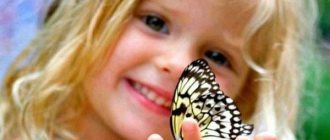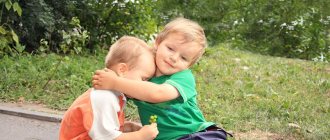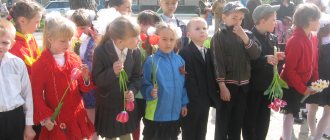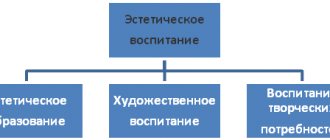Directions of moral development of preschool children
Definition 1
Moral development is the formation in a person of basic moral properties, a meaningful perception of his own personality and its place in the social environment, an understanding of his purpose and the need for continuous improvement of his personality.
Moral development is carried out in the course of moral education.
Moral education is the individual’s assimilation of the fundamentals of morality, the development of moral guidelines for behavior, the assimilation of the fundamentals of the moral functioning of society and the behavioral habits inherent in it.
Moral education is based on moral norms and principles of social behavior. It reflects the continuity of generations and the transfer of social experience.
Are you an expert in this subject area? We invite you to become the author of the Directory Working Conditions
Figure 1. Moral education. Author24 - online exchange of student work
If moral norms are a social category, i.e. they reflect the requirements of society for the behavior of an individual, his compliance with the norms of social interaction, then morality is an internal category, i.e. it is an internal regulator of individual behavior. The moral behavior of an individual in a social environment and its overall development depend on how developed this regulator is.
Moral education begins from an early age of a child. This is relevant because the behavioral habits formed in preschool age become stable foundations of human behavior throughout his life.
Finished works on a similar topic
Course work Moral education of preschool children 440 ₽ Abstract Moral education of preschool children 260 ₽ Test work Moral education of preschool children 210 ₽
Receive completed work or specialist advice on your educational project Find out the cost
The moral education of preschool children is aimed at the formation of an original personality with the skills of social interaction and self-control of behavior. The child must learn to control his actions and actions, express opinions, take into account the needs and interests of another person, develop adequate self-esteem and express his opinions and views, as well as constructively defend his interests in society.
The moral development of a preschooler is focused on the formation of his moral character. The main directions of moral development of a preschooler are:
- Formation of the pupil’s personal properties. It is necessary to create conditions for the disclosure of the natural inclinations of the individual and the disclosure of his potential.
- Moral development of personality. Here, the moral experience of a preschooler’s life is formed, and he masters the experience of social behavior and interaction.
- Developing an adequate attitude towards others: respect for other people’s opinions and points of view, acceptance of someone else’s point of view, different from one’s own, as correct, equality and equivalence of all participants in the social sphere of activity.
- Patriotic education. It is focused on the formation of civic qualities of an individual: love for the Motherland, respect for the customs and traditions of one’s people, awareness of one’s belonging to a particular culture.
- Mastering ethical standards of behavior. They reflect the values of the social environment and the rules of behavior in society, which are unspoken. They are based on the relationship between the interests of the individual and society.
In preschool age, the foundations of moral judgments and assessments are developed. The child comprehends them and learns to apply them in practical activities. In order for a child’s behavior to be formed on the basis of his conditioning by moral norms, it is necessary to organize a system of moral education that takes into account the age-related characteristics of the development of preschoolers and focuses on the social development of the pupil’s personality and his comprehensive humanistic development.
Basic theories of moral development in the family
1. Jean Piaget's theory of moral development
According to the Swiss psychologist J. Piaget, who purposefully studied the characteristics of child development, there are two periods of moral development of children in the family.
- The first period lasts from birth to seven years. It's called heteronomy. Characterized by the imposition of moral principles on a child.
- The second period is after seven years, called autonomy.
J. Piaget believed that cognitive abilities influence the development of morality in a child. Therefore, in his works he presented a list of age stages, each of which is characterized by the formation of morality. Let's look at the stages in detail.
Sensorimotor stage (up to 2 years):
- the development of motor skills is the ability through which understanding of the world around us occurs;
- the child learns about the world through physical interaction: observes objects, takes them in his hands, examines them closely;
- the baby has an awareness of the “permanence of objects,” in other words, that objects exist even in those moments when he does not visually see, hear, or touch them.
Tasks of moral education of preschool children
The moral education of preschool children is focused on developing their moral feelings, ideas and guidelines for social activity, as well as behavioral habits and motives for social activity.
The moral education of preschool children is focused on solving two groups of problems:
- Tasks for developing a mechanism for the moral development of a child. This group of tasks is permanent and sustainable. The mechanism of moral development is associated with the choice of forms, methods and technologies for organizing educational activities, aimed at developing moral ideals in students that correspond to a specific stage of socio-economic development of society.
- Tasks to develop certain qualities and social skills in an individual. These tasks reflect the need to achieve a certain level of development of society and meet its needs. At every historical stage in the development of society, it requires people endowed with certain qualities. Therefore, the tasks of this group change in accordance with the dynamics of the development of the social environment.
Moral education of preschoolers is focused on:
- Education of the fundamentals of cultural behavior and cultural interaction in the social environment;
- Developing collective interaction skills;
- Education of the fundamentals of humanism and humane qualities of the individual;
- Fostering hard work;
- Nurturing patriotic qualities.
The role of communication with peers in the formation of moral qualities of preschool children
In recent decades, the field of communication as a whole has attracted the attention of researchers. The nature of communication, its age-related and individual characteristics, the mechanisms of its flow and changes have become the object of study by philosophers and sociologists (B.D. Parygin, I.S. Kon), psycholinguists (A.A. Leontiev), social specialists (G.M. Andreeva, B.F. Porshnev), child and developmental psychology (Yu.L. Kolominsky, V.S. Mukhina).
The problem of communication between preschoolers and peers, that is, the role and functions of communication with peers in the life and mental development of a child, is becoming increasingly relevant.
Let's consider some information about the vital function of communication that can be found in domestic and foreign literature. B. Spock, pointing out the importance of communication with peers, advises parents to facilitate contacts between children: “Systematically teach children to exchange toys and share treats, whenever possible, bring the child into the company of other children (at least 1-2 times a week for 2-3 hour); and even a one-year-old child, the author believes, should be taken to where there are children.”
According to the idea of J. Piaget, communication with peers is the most important factor in the development of a child, which contributes to the destruction of egocentrism. He argued that only by sharing the views of a child's peers - first other children, and as the child matures - adults - can genuine logic and morality replace the egocentrism inherent in all children, both in their interactions with other people and in their thinking (Piaget, 1965).
S.L. Rubinstein, on the contrary, warned that love for one’s neighbor “with whom one gets along” can easily turn into “extended egoism,” and “egoism” in a double sense is ... detachment from all people. It is likely that communication with other people allows one to overcome the isolation of the child’s social world and make changes in his psyche.
G.A. Zuckerman believes that communication with peers contributes to the development of criticality of opinions, words and actions, their independence from the judgments and desires of others. V.S. Mukhina, noting the multiple influence of communication with peers on the development of a child’s personality, writes that in preschool age, public opinion is first formed and the phenomenon of comfort appears. “...Children begin to listen to the opinions of their peers and obey the opinion of the majority, even if it contradicts their own impressions and knowledge.”
A.N. Leontyev noted that in the first 7 years of life, children consistently develop four forms of communication with adults: intuitive-personal, situational-business, extra-situational-cognitive and extra-situational-personal. An approach to analyzing communication between preschoolers and peers can be based on the theoretical proposition that the nature of both areas of communication between preschoolers is the same. A child’s communication with an adult and a peer are variants of the same communicative activity. The main thing that unites both spheres is the subject of activity, which in both cases is another person, the child’s communicative partner. Consequently, communication with a peer for a preschooler is a communicative activity that is similar in essence to communication with an adult, and to analyze it, one can apply the scheme and techniques developed in the study of communication with adults.
Thus, the need for communication with peers is formed in preschoolers in the third year of life; it is formed on the basis of previously functioning needs and is formed in the real interaction of children.
M.I. Lysina and L.N. Galiguzova note that after identifying a child’s communication skills, we are not talking about the development of communication needs as a whole, but about a qualitative transformation of the content of the child’s need for communication.
Stages of Moral Development
The stage of moral development is determined by the decision we make in a situation of moral choice. Moreover, the decision is free, when no one puts pressure or coerces, and the decision does not bring obvious benefits. In this case, the choice is made on the basis of moral principles.
Lawrence Kohlberg's scale helps to understand what stage of moral development a person is at.
- The morality of obedience (do the right thing to avoid punishment) and the morality of benefit (you to me, I to you).
- Good boy morality (doing the right thing for approval) and maintaining order and social justice (everything must be orderly and organized according to rules, otherwise society will fall apart).
- Expediency and usefulness (justification in each specific case of the logic of choice).
- Finally, the rarest and highest level of moral development is internal moral principles: in this case, a person develops his own moral position, which is justified, appropriated and unshakable.







